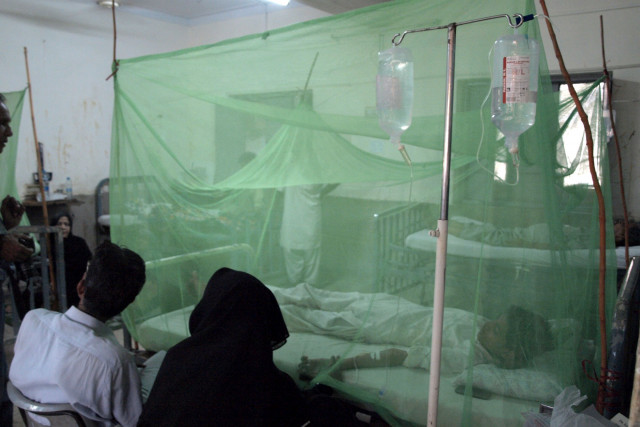How to deal with dengue
Expert says while govt efforts are geared towards treatment, focus should be on the mosquito.

PHOTO: SHAHID ALI/EXPRESS
As a consequence of lacking any scientifically devised strategy to curb dengue, we are suffering from another outbreak in Swat, as well as other parts of Pakistan. Back in 2011, I wrote about the consequences of misdirected efforts of the government to tackle dengue and predicted more outbreaks in the future.
It is surely not going to stop and in the days to come, dengue will make a resurgence in the same areas and also spread to other areas. The Khyber-Pakhtunkhwa government does not seem to understand the gravity of the situation and just as it happened in the past, cosmetic measures may cost us more lives in the future.
Government efforts continue to focus on strengthening treatment and diagnostics for a disease with no specific cure or vaccine available. At the same time, the role of the mosquito -- the root cause of infection -- has drawn little attention in our country. Thus, it would appear that the burden of infection may increase over time as the mosquito is free to breed and infect more people.
Danger lies the second time
Analysis of blood samples from the infected people in Swat indicated that the same serotype 2 and serotype 3 of the dengue virus are highly prevalent there, which means that the current outbreak is a continuation of the previous major outbreak in Lahore. The only difference is the mortality rate which has been comparatively lower in Swat because majority of the people have been infected for the first time. Infact, it is the secondary infection of dengue with a virus type different from the one that caused primary infection which leads to fatal consequences for an individual in the form of dengue hemorrhagic fever, dengue shock syndrome or death. The scale of this outbreak is getting larger as thousands of people have been infected so far and another outbreak of dengue in future could be devastating because the mortality rate may rise as a result of secondary infection. If somebody is infected once, secondary infection during his life time could develop into hemorrhagic fever and shock syndrome.

Suggestions to the govt
The government should consult competent entomologists and biologists so as to devise an effective mosquito eradication strategy based upon the published scientific literature on eradication programs in other countries. Of course, there are short term and long term options and both of them should be taken into consideration. In order to bring about temporary relief, WHO recommended insecticides such as Temephos, Permethrin and Pyroproxyfen should be used alongwith biological agents such as Bti (: Bacillus thuringiensis var. israelensis) or Bs (Bacillus Sphaericus )toxins to target the breeding sites of the mosquito and to disinfect vehicles coming out of the endemic region. Combination of chemical and biological agents have proved to be very effective in killing the mosquito at various stages of its life cycle in a number of countries including.
On long term basis, we should focus on using other biological options (in combination with the use of safe insecticides and Bti/Bs toxins) as these are very effective options.

The Aedes mosquitoes have the potential to transmit yellow fever virus or other flavi viruses as well. A proper mosquito eradication strategy is therefore the need of the hour and the government should shift their focus from strengthening treatment and diagnostics only as these can never prevent the spread of infection and would cause a lot of harm in future. It is high time we start believing in science in order to protect ourselves from deadly pathogens at least.
The writer is head, division of health biotechnology, Institute of Biotechnology and Genetic Engineering Peshawar.
Published in The Express Tribune, September 29th, 2013.



















COMMENTS
Comments are moderated and generally will be posted if they are on-topic and not abusive.
For more information, please see our Comments FAQ